[Editor's Note: Thank you to Craig and David for their reporting from this year's London Film Festival which concluded two days ago. Here they are with a final chat about their treasures and pleasures. -Nathaniel]
Craig: So, David, I guess it's time to mull it over and decide on our "Best of the Fest". Top tens, top fives? More, less? I wonder what we'll agree and disagree on...
David: It's always sad to say goodbye. It might not be the most glamorous or revelatory event on the festival circuit, but it has such a nice atmosphere strewn across Central London, flirting with megastars every so often, but giving equal red carpet steps to the little gems you speak of. A top five definitely isn't enough for me, but I'll give restraining myself my best shot. I've been there most days, and often packed in four in a day (my eyes are paying the price!), so I'd wager I have seen more than you - quality over quantity, though!
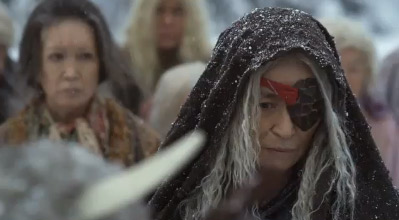 Dendera
Dendera
In my stringently ordered, agonisingly compiled list that I just came up with, a slot would definitely go to Oslo, August 31st, which I offered up some thoughts on just the other day - so I'll give conversation space to a glorious runner-up instead. Dendera – one of the most enjoyable experiences of the fest – is a gloriously demented twist on a Japanese myth invented in Imamura's The Ballad of Naramaya; in this new film, his son Daisuke Tengan explores the afterlife of the elderly who've been put out to pasture. One old woman decided she didn't want to die, thank you, and set up a community on the other side of the hill from the village that cast her out. In short: it's the sort of bloody batshit horror movie you'd have seen in 1980s Britain, not least because of hilariously dreadful bear puppetry that's very similar to Attack the Block.
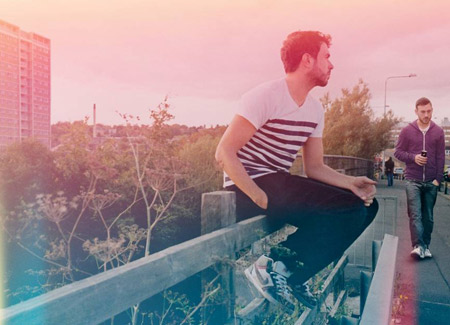 Craig: I’ve heard variable things on Dendera, but your description makes it sound like great fun. Sad I missed it now. And due to timing I had to choose another film over Oslo. Quite unintentionally I saw a lot of rather grim confrontational dramas, although the lighter titles were a delight, so I should first give credit to three not-violent films which won me over immensely. Weekend was a beautifully played affair that grabbed me from the first frame. I loved its naturalistic dialogue, likeable performances and wistfully hopeful overall tone. How sweet to finally have a gay take on the Before Sunset/Sunrise 'will they or won't they?' film! Pariah, another excellent gay-themed romance, was very moving and featured a great central turn from Adepero Oduye. The photography stood out as some of the fest’s best, too. (I wrote about both earlier.) Terri, a cheering and good-natured film about an overweight high school loner, was made with easy style and without sentimental cliché. It snuck up on me in a big way; its emotional impact worked during the film and later, on my way to the tube, it made me smile in the way that obviously quirky indie films of its ilk rarely do. John C. Reilly gave one of his best performances and the humour was well-timed. What gems delighted you, David? I ask this now, before we get to the inevitably gloomier stuff...
Craig: I’ve heard variable things on Dendera, but your description makes it sound like great fun. Sad I missed it now. And due to timing I had to choose another film over Oslo. Quite unintentionally I saw a lot of rather grim confrontational dramas, although the lighter titles were a delight, so I should first give credit to three not-violent films which won me over immensely. Weekend was a beautifully played affair that grabbed me from the first frame. I loved its naturalistic dialogue, likeable performances and wistfully hopeful overall tone. How sweet to finally have a gay take on the Before Sunset/Sunrise 'will they or won't they?' film! Pariah, another excellent gay-themed romance, was very moving and featured a great central turn from Adepero Oduye. The photography stood out as some of the fest’s best, too. (I wrote about both earlier.) Terri, a cheering and good-natured film about an overweight high school loner, was made with easy style and without sentimental cliché. It snuck up on me in a big way; its emotional impact worked during the film and later, on my way to the tube, it made me smile in the way that obviously quirky indie films of its ilk rarely do. John C. Reilly gave one of his best performances and the humour was well-timed. What gems delighted you, David? I ask this now, before we get to the inevitably gloomier stuff...
David: Weekend is so good it deserves repeating. [MORE AFTER THE JUMP ON SEVERAL TITLES...]
So refreshing to have a film about gay men that feels realistic, and energetic with conflicts about how different a lifestyle this is or isn't and so sipmly finely crafted and performed. A world away from gay men in Nottingham, meanwhile, is Nanni Moretti's We Have a Pope, which I almost skipped! It turned out to be both a hilarious absurdist comedy about shut-in cardinals and a moving tale of a deeply conflicted man who's unfortunately just been appointed Pope. What more could you want from a film? And again showing my poor judgement, I almost passed over my penultimate screening. Marc Evans made the rather awkward Patagonia last year (submitted as the UK's Best Foreign Film entry this year), so I didn't have much hope for his new film, especially when it has the title Hunky Dory. But you can't always trust your expectations. Hunky Dory might be a idealistic and simplistic but it turned out to be a heart-warming little community piece that really makes good on its 1970s musical numbers. The treats often get you when you're not looking, I find.
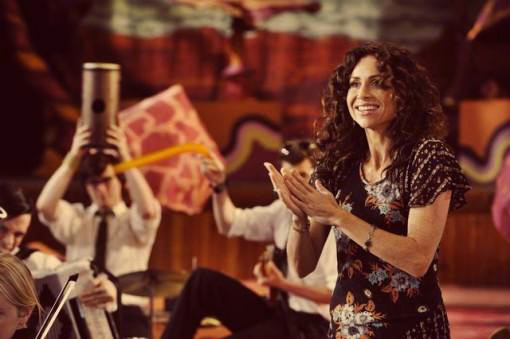 Minnie Driver stars in "Hunky Dory"
Minnie Driver stars in "Hunky Dory"
I think a large part of most festival rosters is made up of the dark stuff, really. It's somehow more respectable, or at least worthier of critique, perhaps because what we see and hear in the news every day seems gloomier and more pessimistic than ever. This is why it's wonderful to have a film like The Artist at the centre of the cinematic conversation this year, both for critics and award watchers ...and soon audiences everywhere! It's really unfettered joy, this one, even when it turns to poignant melodrama in the second half, because it's just so vibrantly alive with love for cinema and for the stars it photographs. I was practically swinging my legs off my seat with giddy joy as the credits rolled. I'm now in love with Bérénice Bejo!
Craig: I think it’s more that drama and/or arthouse fare is what makes up the largest chunk of the fest’s line-up. Priding new, key world cinema titles, often those that have seen exposure elsewhere – Cannes, Venice etc – has always been part of the overall plan with the LFF. And why not. The darker stuff is there to prompt audiences into accepting that the subjects explored do exist in the world around us and that a measured, intelligent and creative artistic response can provoke debate. People can expect this to be part of their experience alongside films like, as you rightly mention, The Artist plus stuff like 50/50, Anonymous and A Cat in Paris for further balance. I think it partly has to do with the successful public response. People like to engage with thoughtful, forward-thinking and relevant cinematic themes. It’s encouraging in an age when talking robots and CGI animals dominate the mainstream. Of course there’s a place for those films too, but ya know...
David: It is encouraging to see the diverse population of London make itself known across the festival experience, and observe that you really can't get a read on what a particular person is going to choose to see and end up enjoying. If I had two wishes for the festival in future years, it'd be these: first, that it more fully expands its wings across different cinemas, so the experience of London as a city is as full as the wide-ranging selection of films. (I realise this may be a logistical nightmare for the staff, however!); second, that there would be a stronger showing for British cinema (though that's a wish they maybe can't control). They got lucky with Terence Davies happening to return with The Deep Blue Sea this year - he's one of the only major British directors currently working I can think of. Weekend shines as an unusual case here. The "New British Cinema" selection is smaller than the "French Revolutions", and it’s too often packed with draining social dramas about urban gangs and domestic abuse. Those aren't necessarily bad subjects for cinema, but I'd love the LFF to grow in stature and somehow that doesn't feel possible when British cinema is so generally lacklustre. But this is perhaps a discussion for another time.
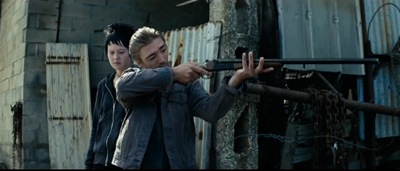 Bruno Dumont's "Hors Satan"
Bruno Dumont's "Hors Satan"
Craig: Speaking of treats (albeit of the darker kind) that often get you when you're not looking, this was the exact case with The Awakening, which I liked a fair bit, though you were more lukewarm about it. I won’t go over it again, save for saying that I liked the ending far more than I liked The Others’ ending. Instead, France and Australia respectively perplexed and stunned me with Hors Satan and Snowtown. I discussed my admiration for the latter just the other day and it’s still increasing in significance and lingering intensely in my mind as one of the year’s best films. But Hors Satan – which gets a UK release next March I believe – was a devilish, toxic little conundrum. I think my tweet just after seeing it was: You baffle me, Satan! But in fascinating ways. Dumont creates an elusive monster. Supreme mind horror, riveting filmmaking. There were probably a lot more exasperated, befuddled exclamation marks than that, but it was my first impression and I think it’s Bruno Dumont’s best yet. Have we spoken about Martha Marcy May Marlene or A Dangerous Method?
David: Snowtown was a treat so dark I almost had to spit it out, although I entered forewarned of how icy and confrontational it was likely to be. Certainly a bracing experience and indeed one of my lasting memories of the festival. I skipped Hors Satan after being burnt by Bruno Dumont with Hadewijch a couple of years ago, but such a disconcerted reaction from you at least promises a film with some life in it.
Craig: I can see why Snowtown would be so divisive but it's a film that positively demands to be seen and discussed. I can’t say I agree with his review but I respect Glenn’s measured analysis. I found the direction striking (as was every other aspect of its filmmaking) and its all-round approach to be authentic and intelligent; no sleight of hand or grim-for-the-sake-of-it aspects as far as I could tell.
 Yet more new cult members of Get Elizabeth Olsen an Oscar NominationDavid: I'm definitely leaning positive on Snowtown. It's most bracing elements didn't seem exploitative so much as a gradual descent into the deepest horrors of this world, circling down from what was a fairly ugly environment in the first place. Strong debut features were very present throughout the festival, I found - something the Sutherland Award is designed to reward, though I sadly missed the winner, Las Acacias. But fellow nominees like Corpo celeste, a delicate and thoughtful coming-of-age story with a terrific performances from young Yle Vianello and the more seasoned Pasqualina Scuncia, and Eternity, a serene ghostly love story, (which actually provided my favourite single scene of the entire festival) were some of the best discoveries of the last month for me. Other debuts like Pariah, Restless City and Martha Marcy May Marlene to create a huge roster of promising newcomers. Speaking of which, Martha... was a totally expected treat, but no less impressive for it, as I wrote in my review of the film a few weeks back. But if you want to talk about Best Actress again, I'll be devastated if Olsen ends up missing out on the edge of the field as she is.
Yet more new cult members of Get Elizabeth Olsen an Oscar NominationDavid: I'm definitely leaning positive on Snowtown. It's most bracing elements didn't seem exploitative so much as a gradual descent into the deepest horrors of this world, circling down from what was a fairly ugly environment in the first place. Strong debut features were very present throughout the festival, I found - something the Sutherland Award is designed to reward, though I sadly missed the winner, Las Acacias. But fellow nominees like Corpo celeste, a delicate and thoughtful coming-of-age story with a terrific performances from young Yle Vianello and the more seasoned Pasqualina Scuncia, and Eternity, a serene ghostly love story, (which actually provided my favourite single scene of the entire festival) were some of the best discoveries of the last month for me. Other debuts like Pariah, Restless City and Martha Marcy May Marlene to create a huge roster of promising newcomers. Speaking of which, Martha... was a totally expected treat, but no less impressive for it, as I wrote in my review of the film a few weeks back. But if you want to talk about Best Actress again, I'll be devastated if Olsen ends up missing out on the edge of the field as she is.
Craig: I think you nail Martha... pretty well in your review, especially the last paragraph. I can say one thing with certainty: it’s one of the most perplexing and disconcerting films I seen recently. Also, very much like Snowtown, it’s not always easy, but supremely confident and a stand-out first film
David: Martha... was only the second film of the festival for me (I racked up an even forty!), but when I think back over the weeks it's still at the front of my mind; Olsen's mysterious, wrenching performance is why. She had a late challenge from Rachel Weisz (in The Deep Blue Sea, not the wig impersonating her in 360), but she holds on as my pick for best performance.
Craig: I was sad that I couldn’t hold on until The Deep Blue Sea, as Davies is always worth the effort (his compositions and leisurely storytelling can be wonderful antidotes on the right days), but sadly the LFF had to finish for me the day before. But it ended with A Dangerous Method...
David: I'd wager it's Cronenberg's least distinctive, least interesting film yet, although Keira Knightley's remarkable jaw movements did make an impression. For a film about the sexual impulse, it felt so clinical and cold. But I believe you felt differently...
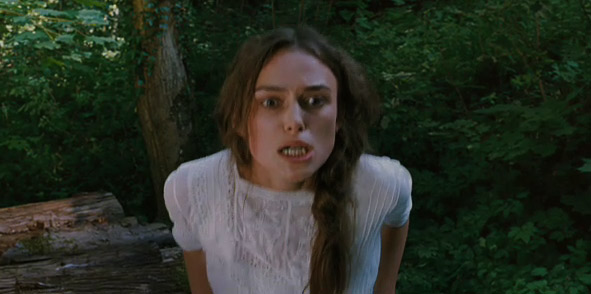 Keira Knightley in Dangerous Mandibles
Keira Knightley in Dangerous Mandibles
Craig: Yes, hah, it seems I did feel a bit different about it. I still believe his least distinctive film is Fast Company, personally – and M. Butterfly a close second. And I’m not sure he’s ever been interested in making a warm film about the sexual impulse. (Never say never though!) I’m not sure about your personal history with Cronenberg, but I’d say he’s possibly my favourite filmmaker. (There are other contenders here, but I won’t bore everyone with them all now.) I’m definitely in the pro camp with A Dangerous Method, I know it’s not prime-cut Cronenberg. It was beautifully directed and vigorously made – and very much an interior film that played its games via the back and forth conversations of its three centrals minds (it was all about the mind, the mouth and the libido operating in both conjunctive and disjunctive ways). People say it's airless and dull, but I’m not sure about that. I didn’t find it stifling and wasn’t bored at any single point. It felt very much a Cronenberg film whilst also being a departure. He’s still the Cronenberg of Shivers, The Brood and The Fly etc, but he’s pointing his compass in different directions with each new film. Bring on Cosmopolis!
David: When I say cold, I do of course expect Cronenberg to tackle this sort of subject with a sort of medical precision, but I meant more that I didn't feel as though he was really putting any emotion into directing it. Jung and Freud's conversations read straight out of an outdated biography, and the sets felt disembodied, without any sense of place. It just felt very straightforward, and I'm not used to that from Cronenberg, although I have to admit that I am not as well versed in him as you are. Knightley's performance felt so abrasively juxtaposed with everything around it, which is why I liked it, because I thought she found a way into the feeling and truth of the character that Fassbender's more intellectual approach never reached. (I'm criticising the Fassbender. Quick, we better talk about Shame before I get lynched!) Sadly, I was bored.
Craig: Anyway, what about the best (and maybe not so good?) in show with acting, cinematography, first feature etc for you?
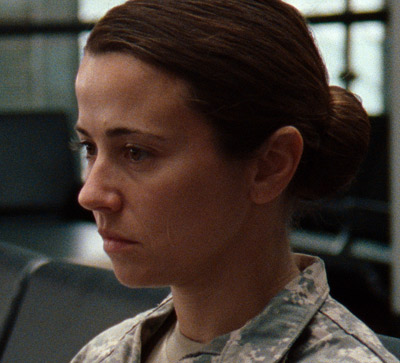 Linda Cardilleni in "Return"David: The below the line star of the festival is one I've mentioned before - cinematographer Bradford Young's work on Pariah and Restless City was some of the festival's most exciting. The sound design of Snowtown was astonishing, and a huge contributor to how effective it was. I wasn't a huge fan of Miss Bala, but there's no denying the technical skill of the graceful tracking shots by Matyas Erdely that guide us through the nightmare experience The recreation of Classic Hollywood locales in The Artist was just one delight of the film, but I could rhapsodise for hours on every single aspect of everyone who worked on that film. I've mentioned my picks for Best Actress, although I can't really pass up this opportunity to also throw a bone to Linda Cardellini, whose performance in the neglected Return (the screening I attended was about 10% full, and Cardellini and director Liz Johnson still turned up for a Q&A, bless them) was a showcase for a really underrated talent - she's steely and direct as a returning war-vet, elevating a somewhat rote narrative. And Deannie Yip's Volpi Cup-winning performance in A Simple Life is as moving as you might imagine. I wrote about Anders Danielsen Lie in Oslo, August 31st last week, and he'd just snatch my Best Actor pick from Fassy in Shame and the fresh, exciting pair of Chris New and Tom Cullen in Weekend.
Linda Cardilleni in "Return"David: The below the line star of the festival is one I've mentioned before - cinematographer Bradford Young's work on Pariah and Restless City was some of the festival's most exciting. The sound design of Snowtown was astonishing, and a huge contributor to how effective it was. I wasn't a huge fan of Miss Bala, but there's no denying the technical skill of the graceful tracking shots by Matyas Erdely that guide us through the nightmare experience The recreation of Classic Hollywood locales in The Artist was just one delight of the film, but I could rhapsodise for hours on every single aspect of everyone who worked on that film. I've mentioned my picks for Best Actress, although I can't really pass up this opportunity to also throw a bone to Linda Cardellini, whose performance in the neglected Return (the screening I attended was about 10% full, and Cardellini and director Liz Johnson still turned up for a Q&A, bless them) was a showcase for a really underrated talent - she's steely and direct as a returning war-vet, elevating a somewhat rote narrative. And Deannie Yip's Volpi Cup-winning performance in A Simple Life is as moving as you might imagine. I wrote about Anders Danielsen Lie in Oslo, August 31st last week, and he'd just snatch my Best Actor pick from Fassy in Shame and the fresh, exciting pair of Chris New and Tom Cullen in Weekend.
And just one last performance to mention: I'm still not over Carey Mulligan's revelatory turn in Shame. It's barely two years since she 'arrived' and she's already stepped it up to a stunning degree. Such a fragile, passionate, scorching performance. But that's enough name-dropping from me. Your turn!
Craig: For the guys, I’ll echo the praise for both Tom Cullen and Chris New in Weekend. Both were beautifully layered performances, though Cullen may just edge it for me. Also, newcomer Jacob Wysocki in Terri was great (the utter baffled joy on his face when he sees an eagle was one incidental highlight – hilarious!) and Jean-Pierre Darroussin in Early One Morning did some great work, too. He can do the put-upon sad sack well, but here he adds some rich notes of complete despair. All the Fassy love is well justified, but let me throw some Viggo Mortensen’s way in A Dangerous Method: his was the best performance in that film. But best of all, and the award for most horrible and horribly gripping character, was Daniel Henshall in Snowtown. I’m certainly not going to forget his performance in a hurry.
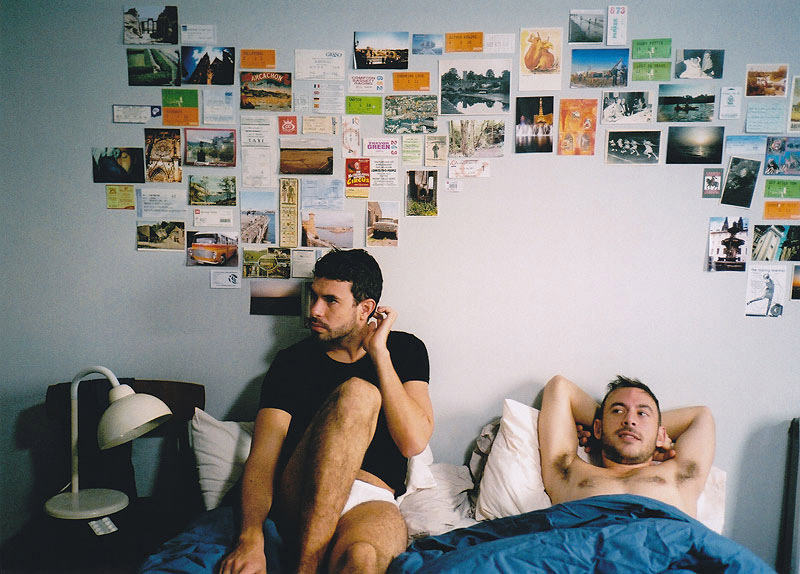 Tom Cullen and Chris New provide a memorable "Weekend"
Tom Cullen and Chris New provide a memorable "Weekend"
For the ladies, I’d say that Elizabeth Olsen in Martha... was unforgettable, the triple treat of Pernell Walker, Kim Wayans and especially lead Adepero Oduye in Pariah were wonderful – their time onscreen was some of the best and most resoundingly true interactions within a film I saw this year. And, again actors who haven’t any previous screen credits, both Alexandra Lemaitre for her expressive vacancy and interior presence in Hors Satan and Louise Harris for her believable fierceness and resignation in Snowtown were exceptional. Also I should throw a bit of praise to both Hugh Dancy and Sarah Paulson’s way for their solid support duties in Martha Marcy May Marlene.
David’s 10 Festival Picks
- Weekend
- The Artist
- Martha Marcy May Marlene
- Oslo, August 31st
- A Simple Life
- Faust
- Snowtown
- Corpo celeste
- I Wish
- We Have a Pope
Craig’s 7 Festival Picks
- Snowtown
- Martha Marcy May Marlene
- Weekend
- Hors Satan
- Terri
- A Dangerous Method
- Pariah